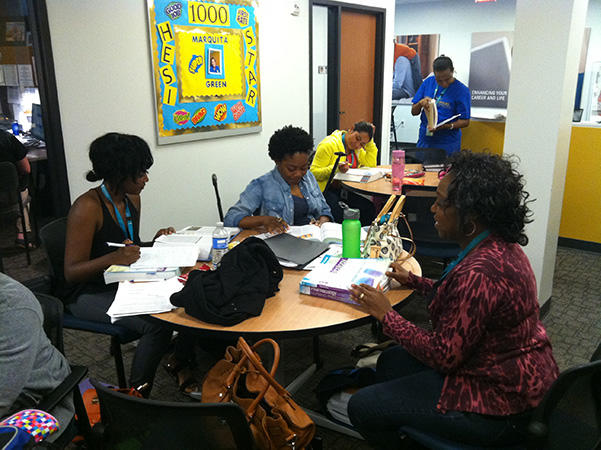Featured
Tags
Share
- Home / Blog / Campus News / Overcome Test Anxiety in 4 Steps
Overcome Test Anxiety in 4 Steps

It’s the day of the big test. You’ve spent countless hours studying, bringing your notes everywhere from the gym to the bus to lunch.
Despite all the preparation, you can’t shake the sinking feeling in your stomach or ignore your racing heart. You sit down in front of the test — and your mind goes blank.
For Monica Muhs, a BSN student at Chamberlain’s Arlington campus, this scenario felt all too familiar. Despite hours spent studying, reading, highlighting and reviewing during MedSurg, she saw little improvement in her test scores.
“I felt like I was in Paris with a map to Rome,” she said. “I was exhausted by the time I finished a test. I was obviously struggling and it was very frustrating.”
After visiting the Center for Academic Success on campus, staff quickly recognized that testing anxiety was behind the frustration. Andrea Kanen, a professional nurse tutor at Chamberlain, began to both tutor Muhs and also work with her on anxiety reduction strategies. From their weekly sessions, Muhs began to feel better equipped to sit for tests.
“[Working with Kanen] has improved my grades, it’s helped the way I take tests, it’s helped me slow down and it’s given me a really big confidence boost,” she said.
Together, they share their tips to overcome test anxiety:
Slow Down to Speed Up Your Success
Anxiety levels are high among everyone at the start of a test. Rather than jumping into the questions as soon as the test is handed out, Muhs now looks at the test and waits for the room to settle before picking up a pen.
Muhs takes the same measured approach throughout the testing time, as one approach to overcome test anxiety. In the past, after rushing through a test, Muhs would later find that many of her incorrect answers came from not reading the question fully—for instance, when a question asks for the response that was NOT correct.
“Now, I take three questions at a time and then I stop and take a breath,” she said. “I then go back and review those questions and make sure I’ve read them fully.”
Relax and Just Breathe
As simple as it sounds, concentrating on your breathing can make a big impact when working to overcome test anxiety.
“Relaxation is really the key to people’s success because when you’re stressed, your mind has a tendency to go blank,” Kanen said. “Once you relax, that information floats to the surface—because it’s there, it’s just a recall issue associated with stress.”
The body cannot give you a stress response and a relaxation response at the same time. It can only give one or the other, Kanen continued. You can make your body have a relaxation response by concentrating on your breathing and giving yourself positive affirmations.
“It’s a skill like any other skill— the more you do it, the better you get at it and then the more control you have over it,” she said.
Drown Out the Noise & Remind Yourself You’ve Got This
Prior to a test, Muhs constantly found herself focused on what would happen if she failed. That anxiety would heighten on exam day, when she arrived at school to find everyone cramming.
“There were 1,000 little voices saying, ‘You need to remember this, don’t forget this, listen to them over there because they’re talking about something that might be on the test,’” she recalled.
To get past the negative thoughts and overcome test anxiety, Muhs pictures a stop sign in her mind and then reminds herself of how well she knows the material. At the beginning of each of her tests at Chamberlain, she also jots down a quote from Winston Churchill that serves as an affirmation:
“Success is not final. Failure is not fatal. It’s the courage to continue that counts.”
Recognize the signs of test anxiety
In many instances, students will visit the CAS because they didn’t do well on a test without recognizing that anxiety is a key problem, Kanen said. Tutors might then review the content with a student without working to improve the underlying issue.
Muhs recommends students verbalize the way they feel when they’re taking a test to get the most out of tutoring and overcome test anxiety.
“If you say, ‘My heart is racing and I can’t think,’ the staff will pick up on those cues and recognize there might be testing anxiety,” she said.
Muhs said she appreciated the full-bodied approach CAS staff took with her struggle and praised them for recognizing her testing anxiety issue and working to address it.
“The main thing that I really want people to know is that just because you’re not getting all ‘A’s doesn’t mean that you’re not a good student or you’re not going to be a good nurse,” she said. “There’s people that can help you achieve your goal.”
Can you relate? Tell us how your tips to overcome test anxiety in the comments below.
Learn more about Chamberlain’s Center for Academic Success.
By Molly Mattison
More from Campus News
Request More Information
To receive the Chamberlain University Program Guide, including associated career paths, please select a program of study.






